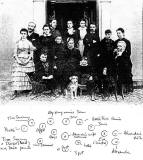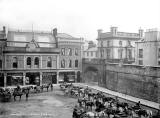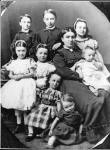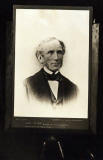|
Alexander Ayton junior
Edinburgh Studios |
|
Comments in BJP |
|
1876
John Nicol, in his 'Notes from the
North' published in the British Journal of Photography gave an account
of Alexander Ayton's arrival in Edinburgh from Londonderry.
[BJP: 28 Jan
1876, p.42]
Nicol
wrote:
|
Notes from the North
|
|
"Notwithstanding the general
complaint of dullness in the photographic trade there are still some who
have faith enough to cast their bread upon photographic waters in the hope
of getting an ample return.
We have, in Edinburgh, a good
example of this in an establishment recently opened in one of the most
centrally-situated parts of the city by Mr Ayton, who has been a
successful photographer in Londonderry for many years; and, if I may
judge from the specimens of work which he has brought with him, I should
say his success is not by any means undeserved."
|
|
"The site on which Mr Ayton's
establishment is erected has been occupied by several professional
photographers in succession for many years; but as the old buildings
were taken down and a new "flat" built, he had the opportunity of
constructing it according to his own fancy.
Mr Ayton has certainly shown not
only good taste, but also a thorough knowledge of the requirements of a
large business, and much consideration for the comfort of his clientele."
|
|
"The studio has certainly one
disadvantage in the fact that it can only be reached by climbing three
flights of stairs; but where really high class work is done, those
requiring it will probably not object to the ascent.
The Reception Room, which is at
the top of a second flight of stairs is elegantly furnished, and
plentifully supplied with specimens of Mr Ayton's productions in various
styles and sizes, nearly the whole of the small pictures being highly
glazed or enamelled by a process of his own.
Probably the most attractive
feature of the room is a number of very fine enlargements of such
excellent quality, artistically, as to show that he is much more than a
mere photographer, and so perfect in manipulation that they defy even an
expert to say whether they are enlargements or direct pictures."
|
|
"Mr Ayton informed me that he
intends to confine himself solely to carbon printing; and, to enable
him to do that to the best advantage he has bought the exclusive right to
use the various Lambert patents in Edinburgh and neighbourhood, but does
not seem to have made up his mind as to whether he will keep the good
things all to himself or will grant a licenses to others in the city.
I think Mr Ayton deserves credit
for being the first in Scotland to go exclusively for carbon, and hope an
appreciative public will reward him by giving him a fair share of
patronage.
I may add that, amongst several
novelties that Mr Ayton kindly showed me in his laboratory and studio,
there was in operation one of the geysers so highly spoken of by Mr Jabez
Hughes, and I fully endorse all the latter has said in its favour.
It is a piece of apparatus which no well-appointed photographic laboratory
should be without."
|
|
[BJP: 28 Jan 1876,
p.42] |
|
|
Studio
1 Hanover Street |
|
1875-80
Alexander Ayton was one of many
photographers to be based at 1 Hanover Street, opposite the Royal
Institution, and remained there for five years, describing his studio as
"Ayton's New Photographic Art
Studio."
He started his photographic business
in Edinburgh as
"Artist;
Miniatures on ivory; artistic
photo-portraiture".
He advertised his exclusive right to use the Patented Processes of Mr
Lambert of Paris, for Edinburgh and Neighbourhood, enabling him to execute
Portraits of all descriptions in permanent pigments, and
advertised:
"By
Appointment to His Excelency the Lord Lieutenant."
|
1876, Advert |
|
"These pictures are superior to the best silver prints, both as regards
Artistic Effect and softness; and they have moreover the long-wished-for
advantage of undergoing no change, either through adverse atmospheric
influence or time, and may be obtained on equally favourable terms as
those by the existing method .
They are also particularly applicable for Enlarging and Finishing.
Instantaneous Pictures of children in superior manner; also for Copying,
Enlarging and Improving Old, Faded and Inferior Photographs of Deceased
Relatives and Friends."
|
|
|
Studio
1892
Bruntsfield Place |
|
1892
The Ayton studio at
Bruntsfield Place opened in 1881. It was eleven years later, when
Edinburgh hosted the Photographic Convention of the United Kingdom, that
members of the photographic press visites some of the Edinburgh
photographic studios, including Alexander Ayton's studio at Bruntsfield
Place.
Here's what they wrote.
|
|
Here is the account that
appeared in the British Journal of Photography:
|
British Journal of
Photography
"The premises of Alexander Ayton jun, in 1892,
included a showroom, studios, darkroom and an engine room with a seven
horse-power engine.
He produced some
large platinotype exhibition prints, for which he was highly praised in
Glasgow and won a Medal in Edinburgh.
He gave lectures to EPS between 1882 and 1892
on Enamelling, fixing of Silver Plates, Transferotype Bromide Paper,
Enlarging from Kodak Negatives, Platinotype Printing and Flashlight
Photography.
Alexander Ayton died in 1894 when he was
EPS President. It was reported that the
EPS Secretary saw him at 1pm on 23 November 1894, in apparently good
health and spirits, and at 5.30 the same day whilst busy preparing for his
holiday trip, he suddenly expired.
The company continued to trade under the name Alexander Ayton until
1940.
[BJP:1892
p548]
|
|
|
The correspondent in
The Practical Photographer, on 1 April 1892, commented on
several of the studios in Central Edinburgh. He referred to Alex
Ayton whom he described as another good worker.
He wrote:
|
The Practical Photographer
"Mr Ayton has added the electric light to
his studio (since December). This is enterprise in a word.
He shows some beautiful platinotype prints,
one grand print in a silver filigree frame - a regular medal taker." |
|
|
Studios
Edinburgh Addresses |
|
1875-80
|
1
Hanover Street
|
|
1881-89
|
43
North Bruntsfield Place
|
|
1890
|
42,43
North Bruntsfield Place
|
|
1891-40
|
42,43 Bruntsfield Place
|
|




